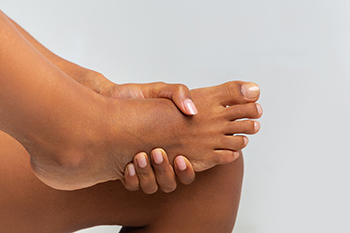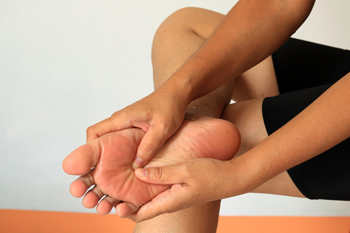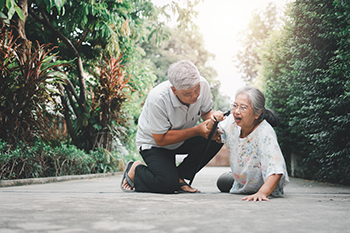Connect With Us
Blog
Items filtered by date: January 2023
Foot Pain and Tight Shoes

Foot pain, no matter the cause, can be considerably uncomfortable and annoying. Many patients who suffer from foot pain often wonder what the exact cause is. Although the answer may be complicated, one common and often overlooked cause of foot pain is wearing shoes that are too tight. When the feet are feeling painful, or sore from wearing tight shoes there are a variety of different things that can be done to relieve the pain. For instance, you may be able to cure the soreness by performing therapeutic stretches, and there are many different kinds and varieties. One such stretch can be performed in a seated position. You might cross one leg over the other and then weave your fingers in between the toes of the foot that is elevated. By spreading the toes apart, you are essentially stretching them. If you are someone that has foot pain, also consider contacting a podiatrist for an evaluation. Schedule an appointment today.
Foot Pain
Foot pain can be extremely painful and debilitating. If you have a foot pain, consult with Michael Tomey, DPM from Cary Foot & Ankle Specialists. Our doctor will assess your condition and provide you with quality foot and ankle treatment.
Causes
Foot pain is a very broad condition that could be caused by one or more ailments. The most common include:
- Bunions
- Hammertoes
- Plantar Fasciitis
- Bone Spurs
- Corns
- Tarsal Tunnel Syndrome
- Ingrown Toenails
- Arthritis (such as Gout, Rheumatoid, and Osteoarthritis)
- Flat Feet
- Injury (from stress fractures, broken toe, foot, ankle, Achilles tendon ruptures, and sprains)
- And more
Diagnosis
To figure out the cause of foot pain, podiatrists utilize several different methods. This can range from simple visual inspections and sensation tests to X-rays and MRI scans. Prior medical history, family medical history, and any recent physical traumatic events will all be taken into consideration for a proper diagnosis.
Treatment
Treatment depends upon the cause of the foot pain. Whether it is resting, staying off the foot, or having surgery; podiatrists have a number of treatment options available for foot pain.
If you have any questions, please feel free to contact our office located in Cary, NC . We offer the newest diagnostic and treatment technologies for all your foot care needs.
Causes and Types of Peripheral Neuropathy

Peripheral neuropathy is a nerve-related condition that interferes with messages sent by the brain to the extremities. The result is that the feet do not receive the proper amount of oxygen and nutrients. The most common symptoms of peripheral neuropathy in the feet are a sharp burning pain, numbness, and tingling. This condition is most common in diabetics and people experiencing kidney disease. Mononeuropathy affects a single nerve, while polyneuropathy affects more than one peripheral nerve. Diabetic neuropathy, which is the most common type, is caused by damage to the nerves as the result of high glucose levels over an extended period. Being overweight, excessive alcohol consumption, high blood pressure, and smoking are among the main contributors. A dangerous side effect of peripheral neuropathy is delayed healing of wounds, which can lead to infection and the formation of ulcers. A number of tests are available to detect the presence of peripheral neuropathy. If you believe you may have peripheral neuropathy in your feet or toes, please consult a podiatrist who is trained to deal with this condition.
Neuropathy
Neuropathy can be a potentially serious condition, especially if it is left undiagnosed. If you have any concerns that you may be experiencing nerve loss in your feet, consult with Michael Tomey, DPM from Cary Foot & Ankle Specialists. Our doctor will assess your condition and provide you with quality foot and ankle treatment for neuropathy.
What Is Neuropathy?
Neuropathy is a condition that leads to damage to the nerves in the body. Peripheral neuropathy, or neuropathy that affects your peripheral nervous system, usually occurs in the feet. Neuropathy can be triggered by a number of different causes. Such causes include diabetes, infections, cancers, disorders, and toxic substances.
Symptoms of Neuropathy Include:
- Numbness
- Sensation loss
- Prickling and tingling sensations
- Throbbing, freezing, burning pains
- Muscle weakness
Those with diabetes are at serious risk due to being unable to feel an ulcer on their feet. Diabetics usually also suffer from poor blood circulation. This can lead to the wound not healing, infections occurring, and the limb may have to be amputated.
Treatment
To treat neuropathy in the foot, podiatrists will first diagnose the cause of the neuropathy. Figuring out the underlying cause of the neuropathy will allow the podiatrist to prescribe the best treatment, whether it be caused by diabetes, toxic substance exposure, infection, etc. If the nerve has not died, then it’s possible that sensation may be able to return to the foot.
Pain medication may be issued for pain. Electrical nerve stimulation can be used to stimulate nerves. If the neuropathy is caused from pressure on the nerves, then surgery may be necessary.
If you have any questions, please feel free to contact our office located in Cary, NC . We offer the newest diagnostic and treatment technologies for all your foot care needs.
Ways to Improve Balance and Prevent Falls in Seniors

One of the main reasons seniors fall is because of a loss of balance. This can be caused by dizziness, muscle weakness, or side effects of certain medications. One fall prevention technique is embarking on an exercise program specifically designed to increase balance and stability. Before taking on any new exercise regime, it is a good idea to check with a medical professional. Among the ways to improve balance are gait training, which is designed to improve the way you walk, and resistance training in a pool to help strengthen the leg and foot muscles. Walking backward and heel-to-toe walking are other methods of improving balance. Standing on one foot for a few seconds, then switching feet is another technique. Caution should be taken when performing these exercises to be near a wall that you can touch if needed. Also, it is wise to have a friend or caregiver present. Further, it may be necessary to invest in an assistive device, such as a cane or walker, to help you complete your daily activities. For more information on preventing falls, please consult a podiatrist.
Preventing falls among the elderly is very important. If you are older and have fallen or fear that you are prone to falling, consult with Michael Tomey, DPM from Cary Foot & Ankle Specialists. Our doctor will assess your condition and provide you with quality advice and care.
Every 11 seconds, an elderly American is being treated in an emergency room for a fall related injury. Falls are the leading cause of head and hip injuries for those 65 and older. Due to decreases in strength, balance, senses, and lack of awareness, elderly persons are very susceptible to falling. Thankfully, there are a number of things older persons can do to prevent falls.
How to Prevent Falls
Some effective methods that older persons can do to prevent falls include:
- Enrolling in strength and balance exercise program to increase balance and strength
- Periodically having your sight and hearing checked
- Discuss any medications you have with a doctor to see if it increases the risk of falling
- Clearing the house of falling hazards and installing devices like grab bars and railings
- Utilizing a walker or cane
- Wearing shoes that provide good support and cushioning
- Talking to family members about falling and increasing awareness
Falling can be a traumatic and embarrassing experience for elderly persons; this can make them less willing to leave the house, and less willing to talk to someone about their fears of falling. Doing such things, however, will increase the likelihood of tripping or losing one’s balance. Knowing the causes of falling and how to prevent them is the best way to mitigate the risk of serious injury.
If you have any questions, please feel free to contact our office located in Cary, NC . We offer the newest diagnostic and treatment technologies for all your foot care needs.
Are Bunions Affecting Your Everyday Life?
Relief Methods for Cuboid Syndrome

There are several names for the foot condition that is known as cuboid syndrome, such as dropped, locked, or subluxed cuboid. The cuboid bone is located on the outer edge of the foot, under the pinky toe. Cuboid syndrome can happen when gradual stress is placed on the cuboid bone, which may possibly tear the surrounding tendons. This can cause the bone to become out of alignment with the rest of the foot, and it is known to be a common injury among dancers, sprinters, and jumpers. The symptoms that are often associated with this type of injury can include pain on the outside of the foot, which may radiate to the toes and ankles, and the injured area may be swollen. Additionally, many patients can begin to limp and may notice that their entire foot feels weak. Patients can find relief when mild stretches are performed, and wearing shoes that have extra cushioning. If you have pain in this part of your foot, it is suggested that you speak with a podiatrist sooner rather than later who can guide you toward the correct treatment options.
Cuboid syndrome, also known as cuboid subluxation, occurs when the joints and ligaments near the cuboid bone in the foot become torn. If you have cuboid syndrome, consult with Michael Tomey, DPM from Cary Foot & Ankle Specialists. Our doctor will assess your condition and provide you with quality foot and ankle treatment.
Cuboid syndrome is a common cause of lateral foot pain, which is pain on the outside of the foot. The condition may happen suddenly due to an ankle sprain, or it may develop slowly overtime from repetitive tension through the bone and surrounding structures.
Causes
The most common causes of cuboid syndrome include:
- Injury – The most common cause of this ailment is an ankle sprain.
- Repetitive Strain – Tension placed through the peroneus longus muscle from repetitive activities such as jumping and running may cause excessive traction on the bone causing it to sublux.
- Altered Foot Biomechanics – Most people suffering from cuboid subluxation have flat feet.
Symptoms
A common symptom of cuboid syndrome is pain along the outside of the foot which can be felt in the ankle and toes. This pain may create walking difficulties and may cause those with the condition to walk with a limp.
Diagnosis
Diagnosis of cuboid syndrome is often difficult, and it is often misdiagnosed. X-rays, MRIs and CT scans often fail to properly show the cuboid subluxation. Although there isn’t a specific test used to diagnose cuboid syndrome, your podiatrist will usually check if pain is felt while pressing firmly on the cuboid bone of your foot.
Treatment
Just as the range of causes varies widely, so do treatments. Some more common treatments are ice therapy, rest, exercise, taping, and orthotics.
If you have any questions, please feel free to contact our office located in Cary, NC . We offer the newest diagnostic and treatment technologies for all your foot care needs.
Foot Pain and the Effect on the Body

There are many reasons why any individual ought to take the health of their feet seriously. One of the most important reasons is because pain in the feet can often have consequential, secondary effects on the body. For example, when an individual is experiencing foot pain, they will often exhibit the effects of this pain by choosing to sit for longer periods of time throughout the day. Also, when an individual has foot pain, this will sometimes affect the way in which a person walks, altering their gait. This is so because foot pain can make an individual alter how they put weight on their feet, avoiding certain particularly vulnerable parts of the feet. However, this, of course, is not the way that it has to be. By consulting a podiatrist, an individual will be able to treat foot pain so that it does not affect how they walk. Consult a podiatrist today to make sure that you are doing all you can to take care of your feet.
Everyday foot care is very important to prevent infection and other foot ailments. If you need your feet checked, contact Michael Tomey, DPM from Cary Foot & Ankle Specialists. Our doctor can provide the care you need to keep you pain-free and on your feet.
Everyday Foot Care
Often, people take care of their bodies, face and hair more so than they do for their feet. But the feet are a very important aspect of our bodies, and one that we should pay more attention to. Without our feet, we would not be able to perform most daily tasks.
It is best to check your feet regularly to make sure there are no new bruises or cuts that you may not have noticed before. For dry feet, moisturizer can easily be a remedy and can be applied as often as necessary to the affected areas. Wearing shoes that fit well can also help you maintain good foot health, as well as making it easier to walk and do daily activities without the stress or pain of ill-fitting shoes, high heels, or even flip flops. Wearing clean socks with closed shoes is important to ensure that sweat and bacteria do not accumulate within the shoe. Clean socks help to prevent Athlete’s foot, fungi problems, bad odors, and can absorb sweat.
If you have any questions please feel free to contact our office located in Cary, NC . We offer the newest diagnostic and treatment technologies for all your foot and ankle needs.

